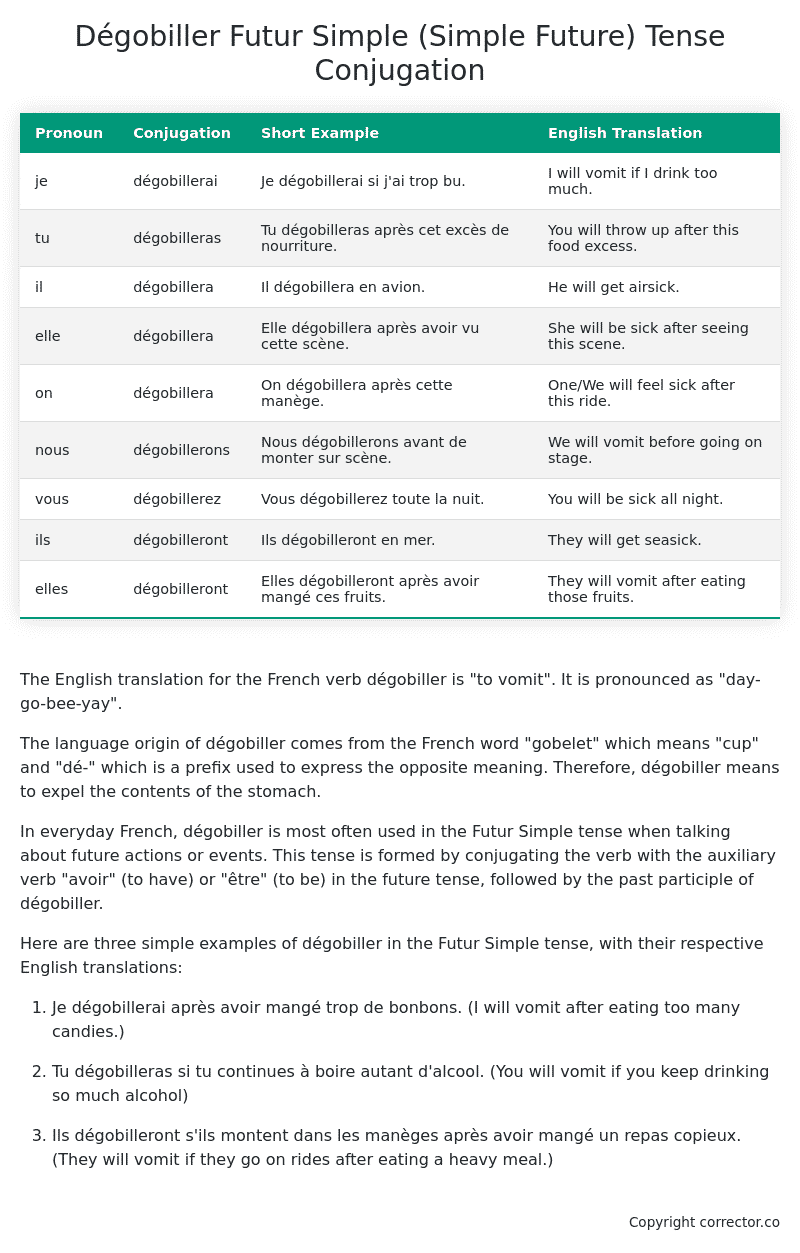Futur Simple (Simple Future) Tense Conjugation of the French Verb dégobiller
Introduction to the verb dégobiller
The English translation for the French verb dégobiller is “to vomit”. It is pronounced as “day-go-bee-yay”.
The language origin of dégobiller comes from the French word “gobelet” which means “cup” and “dé-” which is a prefix used to express the opposite meaning. Therefore, dégobiller means to expel the contents of the stomach.
In everyday French, dégobiller is most often used in the Futur Simple tense when talking about future actions or events. This tense is formed by conjugating the verb with the auxiliary verb “avoir” (to have) or “être” (to be) in the future tense, followed by the past participle of dégobiller.
Here are three simple examples of dégobiller in the Futur Simple tense, with their respective English translations:
-
Je dégobillerai après avoir mangé trop de bonbons. (I will vomit after eating too many candies.)
-
Tu dégobilleras si tu continues à boire autant d’alcool. (You will vomit if you keep drinking so much alcohol)
-
Ils dégobilleront s’ils montent dans les manèges après avoir mangé un repas copieux. (They will vomit if they go on rides after eating a heavy meal.)
Table of the Futur Simple (Simple Future) Tense Conjugation of dégobiller
| Pronoun | Conjugation | Short Example | English Translation |
|---|---|---|---|
| je | dégobillerai | Je dégobillerai si j’ai trop bu. | I will vomit if I drink too much. |
| tu | dégobilleras | Tu dégobilleras après cet excès de nourriture. | You will throw up after this food excess. |
| il | dégobillera | Il dégobillera en avion. | He will get airsick. |
| elle | dégobillera | Elle dégobillera après avoir vu cette scène. | She will be sick after seeing this scene. |
| on | dégobillera | On dégobillera après cette manège. | One/We will feel sick after this ride. |
| nous | dégobillerons | Nous dégobillerons avant de monter sur scène. | We will vomit before going on stage. |
| vous | dégobillerez | Vous dégobillerez toute la nuit. | You will be sick all night. |
| ils | dégobilleront | Ils dégobilleront en mer. | They will get seasick. |
| elles | dégobilleront | Elles dégobilleront après avoir mangé ces fruits. | They will vomit after eating those fruits. |
Other Conjugations for Dégobiller.
Le Present (Present Tense) Conjugation of the French Verb dégobiller
Imparfait (Imperfect) Tense Conjugation of the French Verb dégobiller
Passé Simple (Simple Past) Tense Conjugation of the French Verb dégobiller
Passé Composé (Present Perfect) Tense Conjugation of the French Verb dégobiller
Futur Simple (Simple Future) Tense Conjugation of the French Verb dégobiller (this article)
Futur Proche (Near Future) Tense Conjugation of the French Verb dégobiller
Plus-que-parfait (Pluperfect) Tense Conjugation of the French Verb dégobiller
Passé Antérieur (Past Anterior) Tense Conjugation of the French Verb dégobiller
Futur Antérieur (Future Anterior) Tense Conjugation of the French Verb dégobiller
Subjonctif Présent (Subjunctive Present) Tense Conjugation of the French Verb dégobiller
Subjonctif Passé (Subjunctive Past) Tense Conjugation of the French Verb dégobiller
Subjonctif Imparfait (Subjunctive Imperfect) Tense Conjugation of the French Verb dégobiller
Subjonctif Plus-que-parfait (Subjunctive Pluperfect) Tense Conjugation of the French Verb dégobiller
Conditionnel Présent (Conditional Present) Tense Conjugation of the French Verb dégobiller
Conditionnel Passé (Conditional Past) Tense Conjugation of the French Verb dégobiller
L’impératif Présent (Imperative Present) Tense Conjugation of the French Verb dégobiller
L’infinitif Présent (Infinitive Present) Tense Conjugation of the French Verb dégobiller
Struggling with French verbs or the language in general? Why not use our free French Grammar Checker – no registration required!
Get a FREE Download Study Sheet of this Conjugation 🔥
Simply right click the image below, click “save image” and get your free reference for the dégobiller Futur Simple tense conjugation!

Dégobiller – About the French Futur Simple (Simple Future) Tense
Formation of Futur Simple
For regular -er verbs (e.g., parler – to speak)
For regular -ir verbs (e.g., finir – to finish)
For regular -re verbs (e.g., vendre – to sell)
Common Everyday Usage Patterns
Conditional Statements
Interactions with Other Tenses
Futur Antérieur
Conditional
Present
Summary
I hope you enjoyed this article on the verb dégobiller. Still in a learning mood? Check out another TOTALLY random French verb conjugation!


